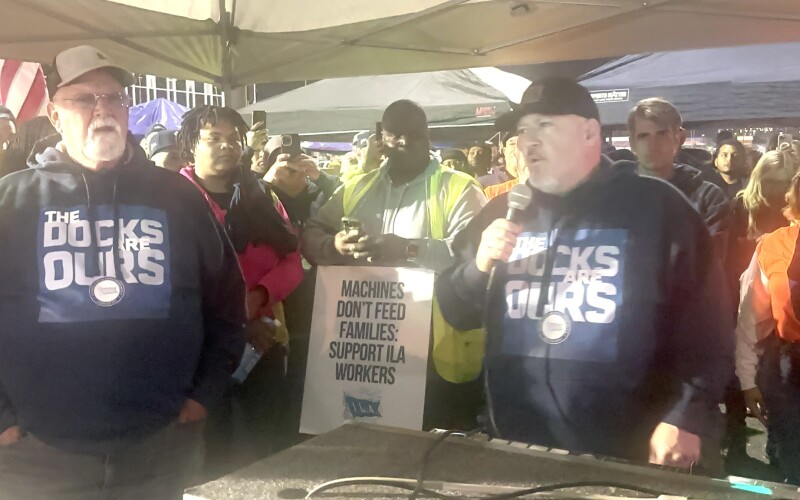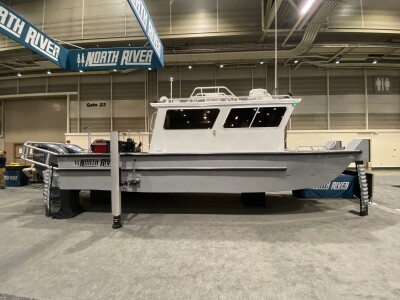U.S. longshoremen and port operators remained in confrontation Wednesday, with 14 major East Coast and Gulf of Mexico ports shut down and hardened rhetoric from both sides.
Around 25,000 workers with the International Longshoremen’s Association participating in the strike closed East Coast and Gulf of Mexico ports, according to the United States Maritime Alliance (USMX), representing terminal operators and ocean carriers.
"USMX brought on this strike when they decided to hold firm to foreign-owned ocean carriers earning billion-dollar profits at United States ports, but not compensate the American ILA longshore workers who perform the labor that brings them their wealth," ILA President Harold Daggett said in a statement posted on social media.
"We are prepared to fight as long as necessary, to stay out on strike for whatever period of time it takes, to get the wages and protections against automation our ILA members deserve."
The ILA’s major demand for 77% wage hikes over five years and a complete ban on the use of automated cranes, gates and container-moving trucks in unloading or loading freight have the union and port operators at loggerheads.
The union base salary is around $81,000 a year although some workers can pull. Down more than $200,000 with copious overtime.
The union sees automation is seem as an existential threat to that standard of living. Shippers and port operators say U.S. ports are in danger of being outstripped in competitiveness as the global maritime industry adopts the technology.
Daggett said “the ILA is steadfastly against any form of automation — full or semi- —that replaces jobs or historical work functions. We will not accept the loss of work and livelihood for our members due to automation. Our position is clear: the preservation of jobs and historical work functions is non-negotiable.”
In a presidential election year, the Biden administration hewed to organized labor interests expressing support for the ILA.
“This country’s port workers put their health and safety on the line to keep working through the pandemic so we could get the goods we needed as Covid raged and these workers will help communities recover from the devastating effects of Hurricane Helene,” said acting U.S. Secretary of Labor Julie Su. “As these companies make billions and their CEOs bring in millions of dollars in compensation per year, they have refused to put an offer on the table that reflects workers’ sacrifice and contributions to their employer’s profits.”
Su said “the parties need to get back to the negotiating table, and that must begin with these giant shipping magnates acknowledging that if they can make record profits, their workers should share in that economic success.”
The potential damage from any prolonged strike raised alarms from U.S. industrial associations, insisting that the Biden administration take stronger action to propel the sides toward settlement. The Associated Builders and Contractors said cargo delays will worsen builders’ material costs.
“President Joe Biden must invoke his powers under the Taft-Hartley Act to restore operations at the ports and bring parties to the negotiating table so a contract can be reached with the help of a federal mediator,” said Kristen Swearingen, the ABC’s vice president of legislative and political affairs. ‘If the Biden-Harris administration is serious about rebuilding America––and maximizing hundreds of billions of dollars in taxpayer investments in infrastructure, clean energy and manufacturing––the construction industry simply can’t afford any more supply chain disruptions and additional costs on critical materials.”
Republican members of Congress likewise called for White House action. House Infrastructure Committee Chairman Sam Graves, R-Mo., and Coast Guard and Maritime Transportation Subcommittee Chairman Daniel Webster, R-Fla., urged Biden to use executive authority “to bring an end to the strike at U.S. East and Gulf Coast ports.”
Biden administration officials said the President “has directed his Supply Chain Disruptions Task Force to meet every day and prepare to address potential disruptions, if necessary. He has also directed his team to continue engaging extensively with labor, industry, state and local officials, ocean carriers, and rail and trucking companies. The Administration has already conducted dozens of meetings with industry on their plans, including multiple meetings with retailers, grocers, manufacturers, agriculture.”
USMX issued a statement saying its supports collective bargaining, and assert “our current offer of a nearly 50% wage increase exceeds every other recent union settlement, while addressing inflation, and recognizing the ILA’s hard work to keep the global economy running.”
In its response the union said it “has rejected their so-called ‘nearly 50% wage increase’ because it fails to address the demands of our members adequately.”
The Teamsters pledged to respect union picket lines at the ports.
“The International Brotherhood of Teamsters, including our members in the freight industry, stand in full solidarity with the International Longshoremen’s Association as they fight for a fair and just contract with the ocean carriers represented by USMX,” Teamsters General President Sea O’Brien said in a Tuesday statement.
“The ocean carriers are on strike against themselves after failing to negotiate a contract that recognizes the value of these workers. Our ILA brothers and sisters play a critical role in keeping the American economy running, and they deserve industry-leading wages and robust job protections for the vital work they perform.”
In the meantime fruit, produce and imported seafood will likely be the first short supplies that consumers see from the strike.
“The first thing that’s going to be impacted is our fresh produce, fresh seafood. About $17 billion worth of fresh seafood come through these ports,” American Farm Bureau Federation economist Danny Munch said, according to NBC Boston. “Those are all very perishable products. They can't just sit in a container forever.”
Up to 60 percent of U.S.-consumed seafood is imported, and much of it comes through the ports of Boston and New York, where fresh fish is quickly processed and shipped through nearby airports.
ILA leadership has rejected responsibility for any consumer cost spikes that arise from the strike.
“The shippers are gouging their customers that result in increased costs to American consumers. They are now charging $30,000 for a full container, a whopping increase from $6,000 per container just a few weeks ago,” Daggett said.
“It’s unheard of, and they are doubling their $30,000 fee, stuffing the same container from multiple shippers. They are killing the customers.”
President Biden has affirmed he would not use the powers of the Taft-Hartley Act, which allows a president to request a court-ordered 80-day pause in strike actions that endanger national health and safety, to force a return to work.
Pressure on the president to intervene will likely intensify, though, as a number of trade groups, including the National Association of Wholesaler-Distributors (NAW), National Retail Federation, and the National Association of Manufacturers, have called for the president to stop the strike, citing the economic damage it will likely cause, especially to small and mid-sized businesses.
New York state officials estimated around 100,000 shipping containers are now stranded in New York City ports, and that around 36 cargo ships will have to remain at anchorage outside the city awaiting the strike's end so they can dock and unload.





